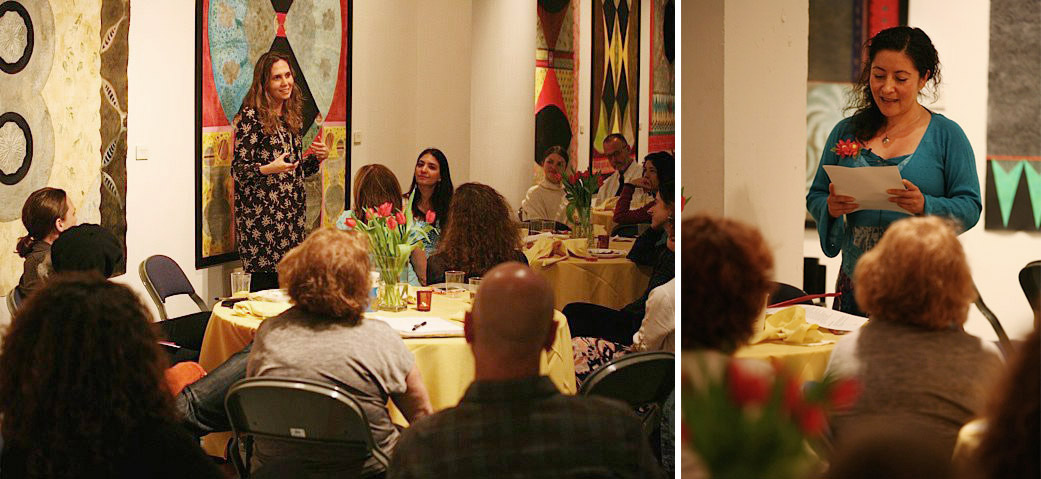By Helen Park

Students from a previous year present their Capstone Projects during a year-end celebratory dinner.
The 2018–19 Compassion Year was an inspired and challenging year full of transitions and growth for us all at the Contemplative Psychotherapy Program in New York City. Over the course of the year, our dedicated and altruistic cohort of practitioners, therapists, coaches, educators, healthcare professionals, and artists engaged with the Mahayana teachings of lojong (“mind training”), Shantideva’s fourfold teachings on compassion, Vajrayana visualization practices, as well as contemporary neuropsychology and research. One of the primary goals of this program is to support our students in a process of embodied learning so that they may take these teachings and implement them into their lives and work, and one of the pathways toward this goal is the Capstone Project.
The Capstone is an opportunity for students to apply their learning into a project of their own design. It can be as simple or complex as they would like, from journal writings to fully developed programs to be implemented in clinical or educational settings. The Capstone is a way for each student to take what is most meaningful to them and translate it into compassionate action. At the year’s end, we hold a celebratory dinner in which students can present their work, and we are always blown away by what we hear.
One of our recent CPP graduates, Anne Rouselot, LCSW is a psychotherapist at the Callen-Lorde Community Health Center, a federally qualified health clinic providing medical, dental and behavioral health services to the LGBTQ community and individuals living with HIV. Over the course of her two-year training with us, she and her colleague and fellow CPP graduate, Candice Martin, LCSW-R developed a module for their Dialectical Behavioral Therapy skills group based on Deborah Lee’s book chapter “The perfect nurturer: A model to develop a compassionate mind within the context of cognitive therapy,” which in turn was inspired by Tibetan deity practice. Anne reports that they are on our second implementation of this module and “have already observed a significant improvement in our patients’ ability to generate self-compassion, as well as a reduction of self-critical and perfectionistic behaviors.”
Another student, Jerry Lamagna, LCSW took various aspects of the compassion teachings, including the meditation practice of tonglen (sending and receiving), and integrated them into his work as an Accelerated Experiential Dynamic Psychotherapy (AEDP) therapist. Jerry created a series of therapeutic interventions that leveraged the positive intersubjective and healing aspects of the compassion teachings. What resulted was a sophisticated and creative set of interventions that integrate the ancient wisdom teachings of Buddhist psychology with the contemporary developments of AEDP, an approach that braids the somatic, relational, and psychodynamic with neuroplasticity and positive psychology. One of the interventions entitled “Active Softening,” takes from Shantideva’s compassion teachings of equalizing self and other. Jerry states that the purpose of this intervention is to create experiences that will support the client in undoing patterns of self-blame, shifting one from a state of threat to one of openness, relaxation, spaciousness, and understanding. This intervention takes in account a neuropsychological understanding of fear states and self-blame and utilizes compassion teachings to support the client in feeling held and safe enough to extend care and empathy toward the self.
Two of our distance learning graduates, Jeanette Sandor and Jan Fielder, teamed up to create and implement an impressive series of programs in the educational setting for children, school staff, and parents. Some of these programs included an 8-week mindfulness program for middle schoolers, delivered to 2 groups of middle school children in an after-school program and three middle school health classes; a workshop for teachers at a high school incorporating mindfulness and compassion and problem-solving strategies taken from DBT; a 3-part series “Empowered Parenting” which they have offered several times and which they call their “hallmark program”; and a workshop entitled “Rethinking Technology,” which incorporates mindfulness and collaborative problem-solving to families around the use of technology. Jan and Jeanette have also gone on to create a program for couples that integrate compassion teachings and practices.
These are just a few examples of the outstanding work our students designed and implemented in their time in the Contemplative Psychotherapy Program. Other inspiring projects included new interventions and programs implemented in hospital settings, therapeutic groups for those formerly incarcerated, undergraduate theatre and performance classes, anti-oppressive and anti-racist group and family therapy work, yoga classes for adults with developmental delays, and so many more.
All of the amazing work our graduates do is the very heart and soul of our program. When I see how students take the wisdom teachings of contemplative science and create new and innovative pathways of healing for those they serve, I am more deeply inspired as a teacher and director of the program to keep growing, engaging, learning, and opening my heart so that CPP may continue to expand its vision, impact, and reach. I am so deeply grateful for the dedicated altruists who come to our program and whom we have the honor to work with.
May our work send out boundless ripple effects of healing, wholeness, joy, and loving-kindness for all!
Helen Park is the Director of the Contemplative Psychotherapy Program (CPP).
Find out more about the upcoming CPP programs starting anew this fall in New York, San Francisco, Toronto, and Spain.
